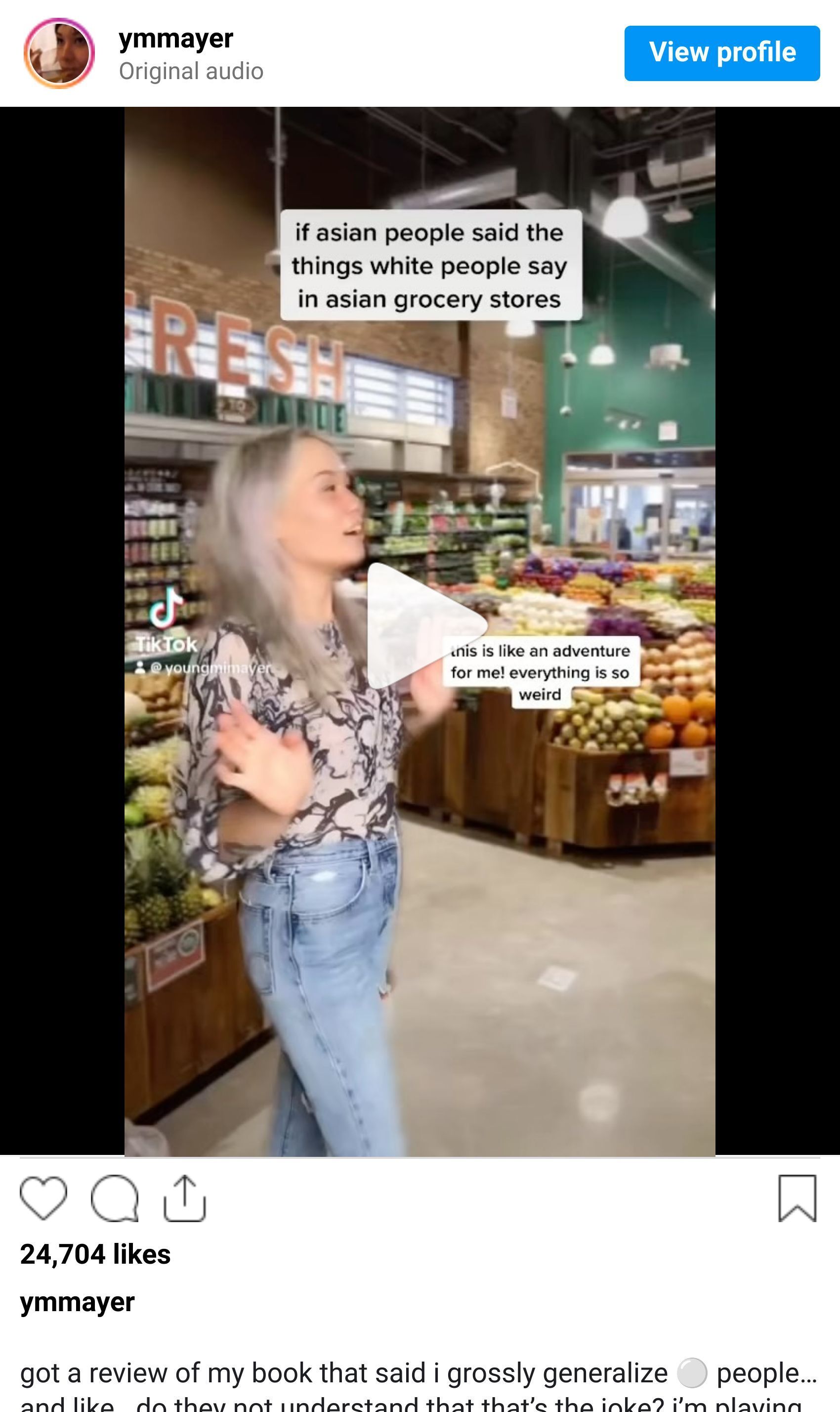- Hyphenly by Immigrantly
- Posts
- Gatekeeping Groceries? Couldn’t Be Us
Gatekeeping Groceries? Couldn’t Be Us
Dear Hyphenly Readers,
Are you as chronically online as we are? We’re constantly scrolling Instagram (usually for fun new recipes), but every now and then a controversy pops up that we need to talk about. And recently, one reel in particular has stirred up a lot of discourse:
The Controversy
In the reel, a Wasian creator says: “I’m a really nice person, but I can’t stop myself from getting snarky to the white people at grocery stores.” She explains that while supporting small, family-owned shops is important, she gets annoyed at white customers who “take up space.”
Creators quickly called her out for gatekeeping—and rightly so.
So why is this reel such a problem? And why are so many Asian creators pushing back? Let’s break it down.
1. Food Is a Right
At the end of the day, food belongs to everyone. According to Feeding America,1 in 5 children don’t have enough food to grow up healthy, and over 50 million Americans rely on food pantries. With inflation and tariffs squeezing small businesses, nearly 55% have raised prices just to stay afloat.
We should be encouraging people from all backgrounds to shop at our beloved cultural stores, not pushing them away. More customers mean stronger communities, more visibility, and continued access to the unique foods we love.
Concerns about gentrification and exoticization are valid, but there are smarter critiques than telling people to “stay out.” Like this:
2. Skin Color Isn’t the Whole Story
Skin color isn’t the same as cultural identity. In a globalized world, people belong to multiple communities at once. One commenter on the original reel said she’s a white Latina who feels too self-conscious to visit her local Mexican store.
People may be mixed-race, adopted, married into a culture, buying a gift, or simply trying a new recipe. We don’t know everyone’s story—and it’s not our job to police it. A wholesome example is Matthew Bailey, a white creator widely embraced for his Soul Food content:
Remember folks: Diversity is everyone’s responsibility.
3. Safe Spaces ≠ Exclusion
Safe spaces matter, especially for vulnerable groups. But public spaces like restaurants, stores, schools, and places of worship cannot function as segregated environments. And the danger goes both ways: an NBC News analysis of FBI data found more than 160 hate crimes at grocery stores in 2020 alone.
4. Ragebait Hurts Your Brain
So much social media runs on outrage: gross food hacks, racist “jokes,” shock-value takes. The more we engage, the more creators profit. Ragebait is exhausting and genuinely affects our mental health. Sometimes the best response is to… simply touch grass, as Gen Z says.
So, What Should We Critique?
Exoticization
Cultural appropriation
Overconsumption
Bigotry
What Can We Celebrate?
The rise of Asian stores and restaurants
Cultural exchange
Community-building
Delicious food
Here’s one example we love: Andy, a Ukrainian creator who lived in Korea and Japan and makes joyful videos trying new snacks.
If you’re an immigrant who is just trying to belong, who doesn’t want to be reduced to a label and stereotype, we may just have the app for you. Listen to Saadia Khan, founder of Immigrantly Media, discussing how she created lessons and challenges for you to ease your journey as an immigrant. Belong On Your Own Terms launches tomorrow (11/18) so mark your calendars!
The best marketing ideas come from marketers who live it. That’s what The Marketing Millennials delivers: real insights, fresh takes, and no fluff. Written by Daniel Murray, a marketer who knows what works, this newsletter cuts through the noise so you can stop guessing and start winning. Subscribe and level up your marketing game.
This newsletter was curated by Suhasini Patni.
Hyphenly curates the latest news, art, and businesses from immigrants around the world. Have a tip or story we should feature? We’d love to hear from you.
Visit us at www.immigrantlypod.com






